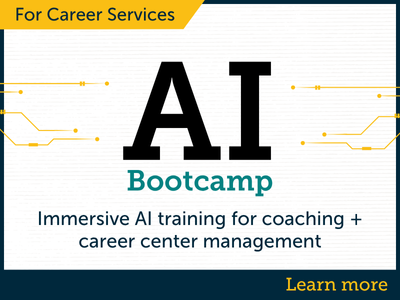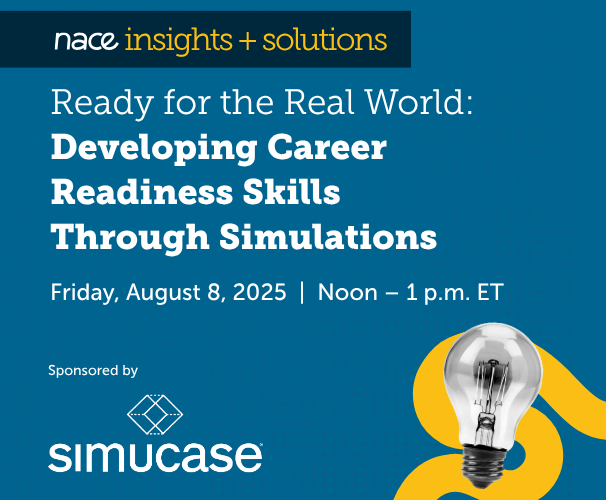NACE Journal / Spring 2025
Career services is a field in constant evolution, reflecting the perpetually changing nature of the job market and the dynamic needs of students and employers. As professionals dedicated to supporting students in their career development, we have observed a growing discourse regarding the roles of career advising and career coaching. Far from being at odds, these approaches are deeply intertwined and mutually reinforcing, each offering distinctive advantages to help students navigate their career trajectories. To prepare students for success—not merely in securing their first job but in cultivating resilient, adaptable career pathways—we must integrate advising and coaching in deliberate, intentional, and thoughtful ways.
Beyond a False Dichotomy
The shift toward incorporating coaching into career services is not a departure from advising but an expansion of our repertoire. Advising, with its emphasis on providing information, guidance, and clear next steps, often addresses students' immediate needs. It is transactional by nature, offering expedient and pragmatic solutions to questions such as, “How do I write a cover letter?” or “Where can I find job openings in my field?” These are indispensable services—no student should leave a career services office without actionable answers to their pressing concerns. Advising provides the scaffolding upon which students can build their initial professional competencies and navigate entry-level challenges with confidence. Coaching, in contrast, emphasizes a reflective and process-oriented methodology. It encourages students to contemplate their goals, values, and aspirations, empowering them to develop lifelong career navigation skills. While advising focuses on the “what” and “how,” coaching delves into the “why.” For instance, coaching might involve asking a student, “What excites you about this opportunity?” or “What competencies do you seek to develop in this role?” These reflective inquiries cultivate self-awareness, emotional intelligence, and the capacity to make informed decisions. Such qualities are critical for sustained career success, particularly in an increasingly complex and unpredictable professional landscape. Moreover, coaching enables students to embrace ambiguity and develop problem-solving skills, preparing them for the iterative nature of career growth. By fostering these higher-order competencies, coaching helps students move beyond a linear view of career progression, equipping them to adapt and thrive in a world characterized by continuous change.

Practical Applications and Challenges
In our office, the integration of advising and coaching is not a universal solution but rather a strategic approach tailored to individual contexts. Certain appointment types naturally align more with an advising approach, such as providing resume critiques, discussing job-search strategies, or demystifying the hiring process. These appointments are often structured, goal-oriented, and focused on delivering immediate value. Other scenarios, such as career exploration or addressing impostor syndrome, lend themselves more naturally to coaching. These discussions often require space for introspection and the building of self-efficacy. Most often, we find a hybrid approach to be the most effective. For example, a student might commence an appointment seeking answers to a specific question, but through adept coaching, we uncover underlying concerns or aspirations that inform a broader and more meaningful dialogue.
However, implementing coaching is not without challenges. Coaching is inherently time-intensive and resource-demanding, rendering it difficult to scale in environments with high student-to-staff ratios. Furthermore, not all students arrive prepared or inclined to engage in the reflective nature of coaching. Some are singularly focused on immediate outcomes and may experience frustration if their needs for prompt solutions are not addressed. These realities necessitate flexibility, creativity, and responsiveness, tailoring our approach to meet each student’s unique circumstances. The ability to pivot between advising and coaching, often within a single appointment, underscores the importance of professional development for career services staff.
Additionally, the institutional context can influence the extent to which coaching practices are adopted. Budget constraints, staffing limitations, and competing priorities may create barriers to scaling coaching initiatives. To address these challenges, offices must explore innovative solutions, such as leveraging technology to deliver coaching content asynchronously or partnering with faculty and alumni to expand coaching capacity. By adopting a collaborative and resourceful mindset, career services professionals can enhance their ability to deliver impactful coaching, even within constrained environments.
Aligning Philosophy with Practice
Striking the optimal balance between advising and coaching requires intentionality and a deep understanding of their respective roles. It begins with training our teams to discern when each approach is most effective. This entails equipping staff with the competencies to transition seamlessly between providing concrete advice and facilitating reflective dialogues. For instance, we have achieved success by framing coaching techniques as complementary to advising, enabling team members to understand how open-ended questions, active listening, and strategic feedback can enrich even transactional appointments.
Institutional culture and resource allocation also play pivotal roles. Leadership must prioritize the professional development of staff, invest in scalable coaching practices, and establish realistic expectations regarding the scope of career services. Partnerships across campus can amplify our efforts, as faculty, alumni, and other stakeholders become collaborators in fostering students’ career readiness. These partnerships can also create opportunities to embed coaching principles into the broader academic and co-curricular experience, ensuring students receive consistent and reinforcing messages about career development.
Furthermore, integrating coaching into career services necessitates ongoing evaluation and adaptation. Collecting data on student outcomes, satisfaction, and engagement can provide valuable insights into the effectiveness of coaching practices and inform future iterations. By adopting a mindset of continuous improvement, career services professionals can remain responsive to the evolving needs of students and the labor market.
The Big Picture: Lifelong Career Empowerment
The integration of advising and coaching reflects a broader paradigm shift in the mission of career services. Our role is no longer confined to assisting students in securing their first job post-graduation. Instead, we aspire to prepare them for a lifetime of career exploration, adaptability, and success in an increasingly dynamic world. By combining the directive clarity of advising with the empowering depth of coaching, we equip students with the tools they require to navigate their careers with confidence and purpose.
Ultimately, the conversation about advising versus coaching should not be framed as a dichotomy but as an opportunity to embrace the full spectrum of our profession. As we continue to evolve, let us commit to meeting students where they are, helping them develop into the adaptable, empowered professionals they strive to become. In doing so, we not only serve our students but also fortify the field of career services itself.
By embedding the complementary strengths of advising and coaching into our practices, we can address immediate needs while also fostering enduring capabilities. This holistic approach ensures that students graduate not only with polished resumes but also
with the self-awareness, adaptability, and strategic thinking required to excel in a perpetually changing professional landscape. In this way, career services transcends transactional interactions, emerging as a transformative force in the lives of
students and the institutions we serve.







